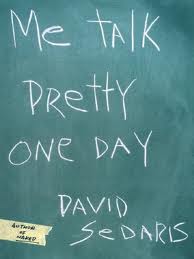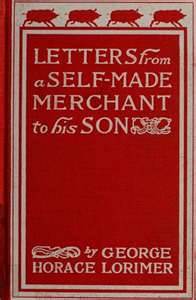Last week I reflected on the expertise I’ve been extracting from my customers. Lately, though, it’s been my counsel that’s in demand. Christmas is the time when people realize how little they know about their loved ones, at least in so far as in pegging them for a gift. So, naturally, they come to me for sage gift advice. I was asked today to provide for a Californian a recommended book that most embodies the essence of North Carolina. I first assured him that no such book existed, but then got down to making the best of a fool’s errand.
“Living or dead?” I asked.
“What’s the difference?”
“The living ones publish more frequently.”
“I mean, would it matter in choosing the book?”
It makes a great difference. The essential North Carolina book today is nothing like the essential North Carolina book of the 1950s, and farther still from the essential North Carolina book of the 1920s,

which, for instance, would be “Look Homeward, Angel,” by Thomas Wolfe, or “In Abraham’s Bosom,” by Paul Green. A hundred years ago Thomas Dixon’s “The Clansman,” might be the book you would choose to reflect the soul of the state. North Carolina literature today is just as likely to be set in a suburb, as in the dusty, sweltering tobacco fields of the rural old south. North Carolina characters today have gay friends and travel abroad; they buy vegan falafels and drink beer that wasn’t made in a bath tub. I ended up recommending a Lee Smith novel, “Cakewalk,” but I could have chosen David Sedaris’ “Me Talk Pretty One Day,” and I wouldn’t have been wrong.
Later, I was asked by a woman to help find a book for her 15 year-old grandson. I asked the standard question: “What does he like?” (as prescribed in the “Idiot’s Guide to Bookselling,”), but she admitted, forlornly, that she really didn’t know. “He lives so far away, I hardly see him,” she confessed. I knew right away that I had the ideal book. First, before I reveal my choice, I need to assure you that I know perfectly well that it is impossible to guess what book someone you don’t really know will like. It’s hard enough to pick a book for someone you know well. And even if you were able to guess what book might be enjoyed, that’s just half the battle. The most perfectly chosen book won’t do anyone any good if the recipient can’t be induced to start reading it. Do you have any idea how many swell book spines have gone uncracked by apparently enthusiastic birthday boys and girls? A lot. The book not only has to be good; it has to look good and sound good, too. And even then, if the reader isn’t in the right mood, he may give it up after five pages, before the story really starts to hum. It’s not easy to get someone to read what you want them to read! Then again if this sort of help didn’t interest me I would have set up a shop to rent textbooks.
 Now, the book I came up with is “Letters from a Self-Made Merchant to his Son,” by George Horace Lorimer, a best-seller when it was published in 1900. My copy is inscribed, “Jan. 1904, N. Mexico.” Lorimer was the editor of the Saturday Evening Post for 37 years, until he died in 1937. He’s also known for discovering Jack London. This book is an amusing collection of homespun wisdom from a fictionalized head of a pork-packing house offered in letter form to his fictionalized son “Piggy.” (Imagine for a minute that Wally and the Beaver had Mark Twain for a dad). When Piggy goes off to Harvard, his father tells him that when the education is being passed around: “You don’t want to be bashful, but reach right out and take a big helping every time. You’ll find that education’s about the only thing lying around loose in this world, and it’s about the only thing a fellow can have as much of as he’s willing to haul away. Everything else is screwed down tight.” About women he says: “You can trust a woman’s taste on everything except men; and it’s mighty lucky that she slips up there or we’d pretty nigh all be bachelors.” And on success: “Some men learn all they know from books; others from life; both kinds are narrow. The first are all theory; the second are all practice. It’s the fellow who knows enough about practice to test his theories for blow-holes that gives the world a shove ahead.”
Now, the book I came up with is “Letters from a Self-Made Merchant to his Son,” by George Horace Lorimer, a best-seller when it was published in 1900. My copy is inscribed, “Jan. 1904, N. Mexico.” Lorimer was the editor of the Saturday Evening Post for 37 years, until he died in 1937. He’s also known for discovering Jack London. This book is an amusing collection of homespun wisdom from a fictionalized head of a pork-packing house offered in letter form to his fictionalized son “Piggy.” (Imagine for a minute that Wally and the Beaver had Mark Twain for a dad). When Piggy goes off to Harvard, his father tells him that when the education is being passed around: “You don’t want to be bashful, but reach right out and take a big helping every time. You’ll find that education’s about the only thing lying around loose in this world, and it’s about the only thing a fellow can have as much of as he’s willing to haul away. Everything else is screwed down tight.” About women he says: “You can trust a woman’s taste on everything except men; and it’s mighty lucky that she slips up there or we’d pretty nigh all be bachelors.” And on success: “Some men learn all they know from books; others from life; both kinds are narrow. The first are all theory; the second are all practice. It’s the fellow who knows enough about practice to test his theories for blow-holes that gives the world a shove ahead.”
As a gift I think this book works because it’s unusual, it’s funny, it’s wise and it can be read in pieces. If the reader quits after 10 pages, he’ll have gotten his money’s worth anyway. And if he picks it up later, he won’t have to start over to remember what’s happened so far. But, my customer ended up buying Tolkien, and there’s nothing wrong with that.
